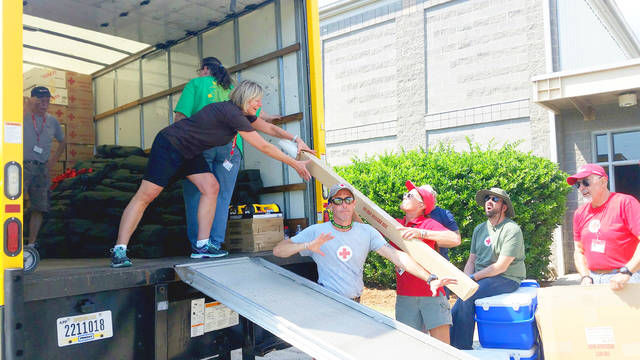LIHUE — Padraic Gallagher, director of disaster services for Kauai for the American Red Cross, was in Macon, Georgia, Friday, loading 6,000 cots onto trucks. He’s in the middle of disaster relief operations with the ARC, one of about a
LIHUE — Padraic Gallagher, director of disaster services for Kauai for the American Red Cross, was in Macon, Georgia, Friday, loading 6,000 cots onto trucks.
He’s in the middle of disaster relief operations with the ARC, one of about a dozen teams roaming through Georgia.
“Once we finish this, we don’t know” where we’ll go, Gallagher said. “Most likely we’ll go south. When we’re done with this, we’ll say, ‘Where do you need 12 people with this type of experience?’”
As of now, Gallagher and his team are in Augusta, Georgia, helping to clean up the shelter operations in that area.
He was one of two ARC volunteers from Kauai who left for the Mainland as Hurricane Irma barreled toward Florida in early September. He left Kauai Sept. 7 and plans to be on the Mainland until Thursday.
“I flew into Raleigh (North Carolina) and got orders to get to Macon, where we opened up two shelters,” Gallagher said.
One shelter was aimed at those with special and access needs, and that shelter accepted about 90 people. The other shelter was filled with almost 200 evacuees from southern Georgia.
People started arriving early Sept. 10 and the storm hit Sept. 11.
“It really felt like something you’d see in the movies,” Gallagher said. “The building was pretty secure, but you could hear it whistling.”
A challenge Gallagher faced over the past few days was a lack of information flowing into the shelters. In fact, they weren’t even sure when the storm was going to hit.
“They said, ‘Do a lockdown at 8 a.m. and don’t let people out,’ but the storm didn’t hit until 11 p.m.,” Gallagher said. “So overnight, that was when the wind was really bad.”
Anna Myers, Red Cross volunteer from Princeville, left for Orlando on Sept. 6 and ended up in Tallahassee.
“They had the brunt of it and she hasn’t had access to communication,” Gallagher said.
TGI wasn’t able to reach Myers, but Gallagher said he received a few text messages early Friday that confirmed her safety.
“She said it was pretty rough, so they gave her the day off after that,” he said.
In Georgia, Gallagher arrived after most of the people had already gone to the shelters, so he immediately set to work registering them, finding them cots and doing visual checks for any obvious medical needs.
“It was a fairly poor population coming in,” he said. “A lot of the people didn’t have the means or transportation to get someplace safe.”
The state of Georgia supplied buses for those people, and transported them to the shelter.
“Once the storm hit, we weren’t letting anyone outside,” Gallagher said. “There was a lot of wind and a little rain.”
While Gallagher has been part of disaster relief operations worldwide, he said response to Hurricane Irma was a new experience.
“This is so much bigger,” he said. “We don’t even know the whole encompassing effects of it because so many different people have been affected.”


